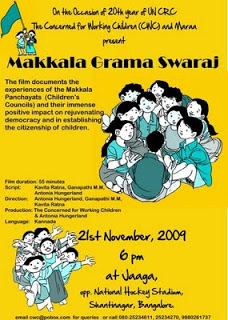What children can do!


Given the right support, every child has the potential to effect change. Education is a basic right of every child according to the United Nations Convention on the Rights of the Child. The document was adopted 20 years ago, and to celebrate this convention the Concerned for Working Children (CWC) showed an excellent documentary called ‘Makkala Grama Swaraj’. Produced by CWC and Antonia Hungerland, the film documents the rise and truimph of the makkala panchayats (children’s councils) in Kundapur Taluk in coastal Karnataka.
The film shows how duly-elected children of the grama panchayats draw up plans and present them to the local governing bodies. Their detailed presentations regarding the issues and problems related to education, basic facilities, personal problems, gender discrimination, disability and child labour have resulted in several positive outputs like the building of a bridge across a river. The whole exercise of selecting child members, electing them and running the panchayats is an excellent live lesson to all the children in the area, far more effective than any lesson in a classroom.
Children have clearly demonstrated how they can use political space to negotiate with the local governments and influence decision-making processes. Several adults who have interacted closely with children, as well as those who are well aware of the children’s process, such as former Planning Commission member L. C. Jain share their reflections in the film.
CWC has played an instrumental role in capacity building for both adults and children. This has resulted in children involved with the Makkala Panchayats becoming increasingly equipped with the means to deal with local government structures.
The film screening was done with the help of Maraa, a media collective based in Bangalore. Maraa is dedicated to reclaim media space for communities, and address, both issues of social justice, as well as creative expression. The film screening happened at a unique place called Jaaga, a creative common ground. Jaaga is a community space created to serve the arts, technology and social change communities in Bangalore.
The film inspires on all levels. It shows that children are capable of a lot more than we think they are capable of. That local governments do work. That there are NGOs like CWC and collectives like Jaaga and Maraa that believe in collective intelligence and in the advantage of Creative Commons.
Schools, organisations, colleges can contact CWC and ask for a free screening of the 55-minute film. Though the film is in Kannada, even those who cannot understand Kannada can follow the film. With some funding, CWC is ready to insert English sub-titles too.








